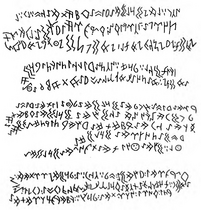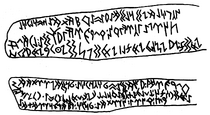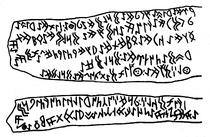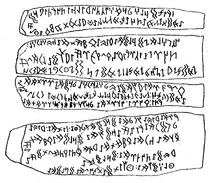| Data sheet
|
| Identifier
|
Tyva 3
|
| Alternative names
|
E-11, M-40
|
| Place of origin
|
Republic of Tyva, Russia
|
| Date
|
Unknown
|
| GPS Coordinates
|
No exact coordinates available
|
| Current location
|
Minusinsk Martyanov Museum
|
| Curator's URL
|
http://музей-мартьянова.рф
|
| Material
|
Stone
|
| Tamga
|
No
|
| Historical affiliation
|
Enisei Kyrgyz
|
| Deciphered
|
Yes
|
| 3D representation
|
Yes
|
| Map
|
Loading map... {"minzoom":false,"maxzoom":false,"mappingservice":"leaflet","width":"auto","height":"350px","centre":false,"title":"","label":"","icon":"","lines":[],"polygons":[],"circles":[],"rectangles":[],"copycoords":false,"static":false,"zoom":6,"defzoom":14,"layers":["OpenStreetMap"],"image layers":[],"overlays":[],"resizable":false,"fullscreen":false,"scrollwheelzoom":true,"cluster":false,"clustermaxzoom":20,"clusterzoomonclick":true,"clustermaxradius":80,"clusterspiderfy":true,"geojson":"","clicktarget":"","imageLayers":[],"locations":[{"text":"","title":"","link":"","lat":51.94,"lon":94.35,"icon":""}],"imageoverlays":null} |
The inscription was found by Oshurkov in 1892 at the river Begre, a tributary of the Enisei. The stone was transported to the Minusinsk Martyanov Museum in 1916 and catalogued under No. 40 as part of the open air exhibition. It measures 143 x 39 x 27 centimetres. The text runs on all the four sides of the stone. A 3D model of the stone is available in the database of the RSSDA Laboratory under the number VE0701.
Editions
Radloff (1895, 314-317), Orkun (1940, 71-76), Малов (1952, 29-34), Батманов and Кунаа (1963 b, 24-27), Васильев (1983, 19-20, 61, 92), Кормушин (1997, 270-276), Аманжолов (2003, 119-121), Базылхан (2005, 178, 330), Кормушин (2008, 102-104), Yıldırım, Aydın and Alimov (2013, 44-47), Aydın (2015, 55-59), Kormuşin, Mozioğlu, Alimov and Yıldırım (2016, 72-76), Aydın (2019, 69-75)
Transliteration
- Front side
- tẄrpA . IčrkIḅn . ḅṣygrmIYšDA . LNmṣmKWnǰYmA . BWŊA . DRLDmA . sIzmA . kẄnAYA . zDmA
- ẄčWGLmADRLDmAYIṬAḅẅkmdmAKṬGLNGL
- Left side
- bšygrmI . YšmDA . TBGčKNGA . BRDMA . rrdmmẄčn . LPWN . LTWN . kẄmšg . grItbAeldA . kIšI : KzGNDmA
- ytI : bẄrI . ẄlrdmA . BRšG . kẅkmkg . ẄlrmdmA[1]
- Back side
- yrmAYIṬAšWBmADRLDmABWŊAsIzmA . YIṬA
- BWDNmA . kInmAKDšmA . DRLDmA . bẅkmdmA
- elmAKNmAbẅkmdmA . YšmytIytmšzDmA .
- YṬDAtẄŋrmA . DRLṬmA
- ndLGDšmAndšIzmAdgẄṣmADRLDmA
- Right side
- skIzDKLGBRMGẄčtẄYILKItẄktIyRDmAndA . bẅkmdmAYṬAẄrŋmgAKRAmGAzDmA
Transcription
- Front side
- tör apa ičräki bän bäš yägirmi yašda alïnmïšïm[2] qunǰuyïm a buŋ a adrïldïm a äsizim a[3] kün a ay a azdïm a
- üč oɣlïm adrïldïm a ayïta[4] bökmädim a qatïɣlanɣïl
- Left side
- bäš yigirmi yašïmda tabɣač qanɣa bardïm a är ärdämim üčün alpun altun kümüšig ägri täbä eldä kiši qazɣandïm a
- yäti böri ölürdim a barsïɣ kökmäkig ölürmädim a
- Back side
- yärim a ayït a subïm a adrïldïm buŋ a äsizim a ayït a
- bodunïm a äkinim a qadašïm a adrïldïm a bökmädim a
- elim a qanïm a bökmädim a yašïm yäti yätmiš azdïm a
- yatda tüŋürim a adrïltïm a
- andlïɣ adašïm a andsïzïm a ädgü äšim a adrïldïm a
- Right side
- säkiz adaqlïɣ barïmïɣ[5] ... yïlqï tükäti ... anda bökmädim a ayït a ürüŋimgä qaramɣa azdïm a
Translation
- Front side
- I am Tör Apa, from the ruling class. O my consort whom I married when I was fifteen! O, what a grief! O, I departed! O my sorrow! O Sun and Moon! I have lost my way!
- O my three sons, I departed. May thou say! I did not get fully satiated! Exert yourself!
- Left side
- O, I was fifteen when I went to the Tabgach khan! Because of my manly virtues and toughness I acquired gold, silver, humped camels and people for the realm.
- I killed seven wolves! I did not kill large felines or deer!
- Back side
- O my land, may thou say, o my water! I departed! O, what a grief! O my sorrow! May thou say!
- O my people, o my progeny, o my kinsmen! I departed! I did not get fully satiated!
- O my realm, o my khan! I did not get fully satiated! I was sixty seven. I lost my way!
- O my relations by marriage being in foreign countries! I departed!
- O my sworn and unsworn comrades, o my good companion! I departed!
- Right side
- ... my eight legged properties. I went ... livestock completely. I did not get fully satiated there! May thou say! I lost my noblemen and common people!
- ↑ The final word on the left side in line 2 is written most probably mistakenly as ⟨RlrmdmA⟩. The correct form should have been ⟨ẄlrmdmA⟩, see ⟨R⟩ and ⟨Ẅ⟩.
- ↑ The word alïnmïšïm is not a finite form as sometimes suggested in the literature, see e.g. 'ya bȳl vzyat (na vospitanie k kitaĭtsam)' in Малов (1952, 29), but a non-finite participle headed by the noun qunǰuy.
- ↑ Tekin (1964) pointed out that the runiform letters ⟨sIz⟩ are to be read as äsiz 'alas'.
- ↑ The runiform letters ⟨YITA⟩ are read as ayït a, that is the 2nd person imperative of the verb ayït- 'to say' with interjection.
- ↑ The phrase säkiz adaqlïɣ barïm most likely describes properties or belongings of the pastoral nomads pulled by four legged draught animals on four wheeled carts, hence the number eight.
Grapheme inventory
Pictures and drawings
References
Aydın, Erhan 2015. Yenisey Yazıtları. Konya:
Kömen Yayınları.
EniseiAydın2015TurkishLatin
Aydın, Erhan 2019. Sibirya'da Türk İzleri: Yenisey Yazıtları. Istanbul:
Kronik Kitap.
EniseiAydın2019TurkishLatin
Kormuşin, İgor, Mozioğlu, Emine, Alimov, Risbek, Yıldırım, Fikret 2016. Yenisey - Altay - Kırgızistan Yazıtları ve Kâǧıda Yazılı Runik Belgeler. Ankara:
BilgeSu.
Еnisei, Talas, TurkestanKormuşinMozioğluAlimovYıldırım2016TurkishLatin
Orkun, Hüseyin Namık 1940. Eski Türk Yazıtları, 3. İstanbul:
Devlet Basımevi.
YeniseiOrkun1940TurkishLatin
Radloff, Wilhelm 1895. Die alttürkischen Inschriften der Mongolei. St. Petersburg:
Buchdruckerei der Kaiserlichen Akademie der Wissenschaften.
Yenisei, OrkhonRadloff1895GermanLatin
Radloff, Friedrich Wilhelm 1896. Atlas der Alterthümer der Mongolei, 3. St. Petersburg:
Akademie.
Yenisei, OrkhonRadloff1896GermanLatin
Tekin, Talat 1964.
‘On a misinterpreted word in the Old Turkic inscriptions’, Ural-Altaische Jahrbücher 35: 134–144.
Enisei, Orkhon, TalasTekin1964EnglishLatin
Thomsen, Vilhelm 1916. Turcica. Études concernant l'interprétation des inscriptions turques de la Mongolie et de la Sibérie. Helsingfors:
Société Finno-Ougrienne (Mémoires de la Société Finno-Ougrienne, 37).
Orkhon, EniseiThomsen1916FrenchLatin
Yıldırım, Fikret, Aydın, Erhan, Alimov, Risbek 2013. Yenisey - Kırgızistan Yazıtları ve Irk Bitig. Ankara:
BilgeSu.
Yenisei, Talas, TurkestanYıldırımAydınAlimov2013TurkishLatin
Аманжолов, Алтай Серсанович 2003. История и теория древнетюркского письма. Алматы:
Мектеп.
Еnisei, Orkhon, TalasАманжолов2003RussianCyrillic
Базылхан, Нәпіл (ed.) 2005. Қазақстан тарихы туралы түркі деректемелері, 2: Көне түрік бітіктастары мен ескерткіштері (Орхон, Енисей, Талас). Алматы:
Даук-Пресс.
Enisei, Talas, OrkhonБазылхан2005KazakCyrillic
Батманов, Игорь Алексеевич, Кунаа, Александр Чайбарович 1963 b. Памятники древнетюркской письменности тувы, 2. Кызыл:
Тувинское книжное издательство.
EniseiБатмановКунаа1963bRussianCyrillic
Васильев, Дмитрий Дмитриевич 1983. Корпус тюркских рунических памятников бассейна Енисея. Ленинград:
Наука.
EniseiВасильев1983RussianCyrillic
Кормушин, Игорь Валентинович 1997. Тюркские енисейские эпитафии: Тексты и исследования. Москва:
Наука.
EniseiКормушин1997RussianCyrillic
Кормушин, Игорь Валентинович 2008. Тюркские енисейские эпитафии: Грамматика, текстология. Москва:
Наука.
EniseiКормушин2008RussianCyrillic
Малов, Сергей Ефимович 1952. Енисейская письменность тюрков: Тексты и переводы. Москва, Ленинград:
Наука.
EniseiМалов1952RussianCyrillic
Щербак, Александр Михайлович 1970.
‘Енисейские рунические надписи: К истории открытия и изучения’, Тюркологический сборник 1970: 111–134.
EniseiЩербак1970RussianCyrillic
Authorship
Károly, László 2024, 2 February. ‘Begre’, in László Károly, Julian Rentzsch (eds) A Database of Turkic Runiform Inscriptions, Uppsala: Department of Linguistics and Philology. URL: https://www.runiform.lingfil.uu.se/wiki/Begre (accessed 01 Sep 2025)



















































